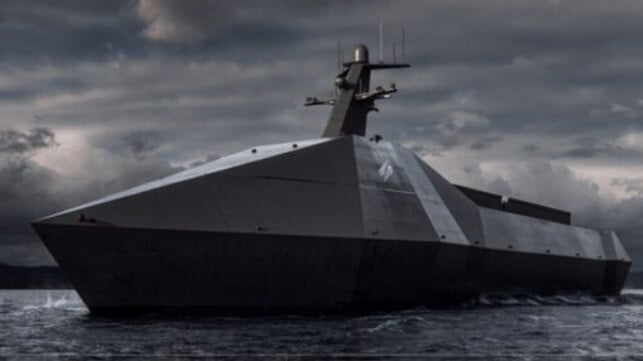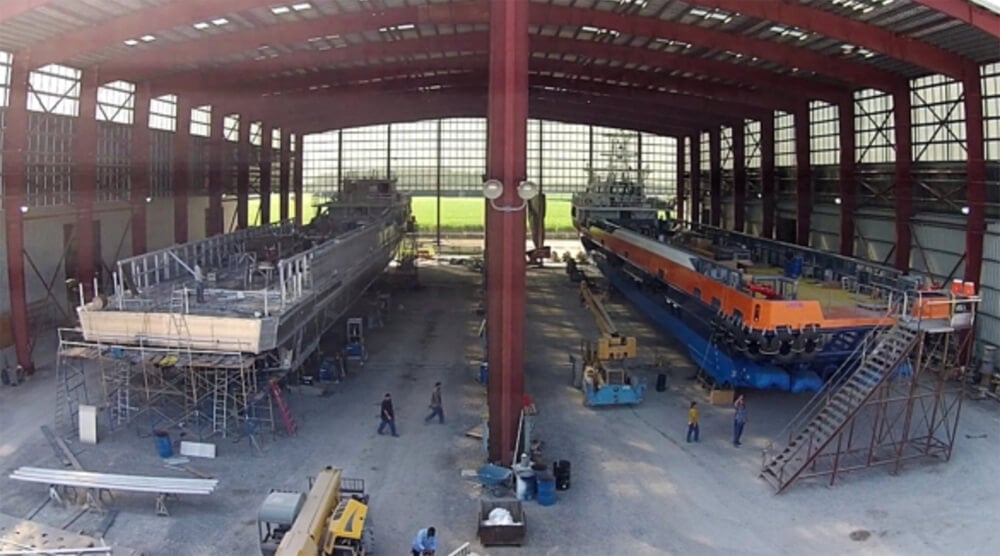Louisiana Shipbuilder Gulf Craft Acquired to Build Autonomous Vessels

Saronic, a start-up launched in 2022 to focus on autonomous vessels for defense systems, acquired Gulf Craft, a Louisiana-based shipbuilder, to accelerate its growth into autonomous shipbuilding. The company says it gives it an immediate capability in shipbuilding as it also unveiled its concepts for a next-generation 150-foot vessel named the Marauder.
Gulf Craft located in Franklin, Louisiana is a custom builder of aluminum boats. Established in 1965, the company builds ferries, offshore support, and other commercial vessels.
"Today marks a significant milestone in Saronic's expansion into autonomous shipbuilding and lays the foundation for our vision of our larger, next-generation shipyard, Port Alpha," said Saronic CEO Dino Mavrookas. "While we actively search for a home for Port Alpha, this acquisition gives us the immediate capacity to meet urgent customer needs for larger autonomous vessels and the flexibility to scale to address emerging commercial and defense applications of these advanced systems."
Saronic announced in February 2025 that it had completed its next round of funding raising $600 million in its Series C round. Having invested in developing and expanding its manufacturing capabilities for its small ASVs over the past two years, the company outlined its vision for a new shipbuilding base that it calls Port Alpha. It said the new shipyard would be capable of delivering new classes of autonomous ships at the speed and scale needed to protect and defend the maritime domain.
The company reports the acquisition of Gulf Craft provides a strategically located shipyard on the Gulf Coast that will serve as the prototyping and production hub for its medium unmanned surface vessel (MUSV) fleet. The yard provides the infrastructure and skilled workforce it says will be needed to develop, rapidly iterate, and scale the production of Saronic's MUSVs today and into the future. Saronic has retained Gulf Craft's workforce and expects to create more than 500 new jobs over the next 3-4 years. In addition to bringing on skilled shipbuilders, welders, and electricians, Saronic anticipates creating new roles for engineers, technologists, and naval architects to develop and scale production of its MUSVs.

Gulf Craft builds aluminum commercial vessels at its shipyard in Louisiana (Gulf Craft)
The acquisition adds nearly 100 acres to Saronic's footprint, supporting both immediate MUSV development and production as well as capacity for significant expansion. Saronic plans to invest more than $250 million directly into the shipyard, which will encompass large facility upgrades that will enable it to apply a first-principles approach to shipbuilding. This includes modernizing infrastructure, acquiring new machinery, and updating the facilities while focusing on building a production system engineered for speed, scalability, and quality. These upgrades will support a rapid capacity ramp-up, enabling Saronic to deliver up to 50 unmanned ships per year.
The company also unveiled Marauder, a 150-foot Autonomous Surface Vessel (ASV) designed to support a wide range of missions for the U.S., its allies, and commercial customers. With a payload capacity of 40 metric tons, the autonomous ship is designed to travel up to 3,500 nautical miles or loiter for 30+ days, depending on mission requirements.
Meet the newest member of Saronic’s family of Autonomous Surface Vessels. Bayou-born. Mission-ready. Marauder.
— Saronic (@Saronic) April 16, 2025
At 150-feet, Marauder is a medium unmanned surface vessel (MUSV) that will integrate the same proven autonomy stack used across Saronic’s existing ASVs. This new vessel… pic.twitter.com/A51DKOSl2t

that matters most
Get the latest maritime news delivered to your inbox daily.
Marauder is designed to be fully unmanned and will integrate the autonomy stack used across Saronic's existing family of ASVs. The vessel incorporates Saronic's vertically integrated approach, disciplined engineering philosophy, and strong domestic supplier network.
As part of its long-term vision, Saronic says it intends to invest over $2.5 billion to develop Port Alpha, which it calls the world's most advanced shipyard, designed to produce hundreds of unmanned vessels annually. It looks to align its operations with the national efforts to revitalize the U.S. shipbuilding industrial base and capitalize on the U.S. Navy’s growing interest in future autonomous systems.
